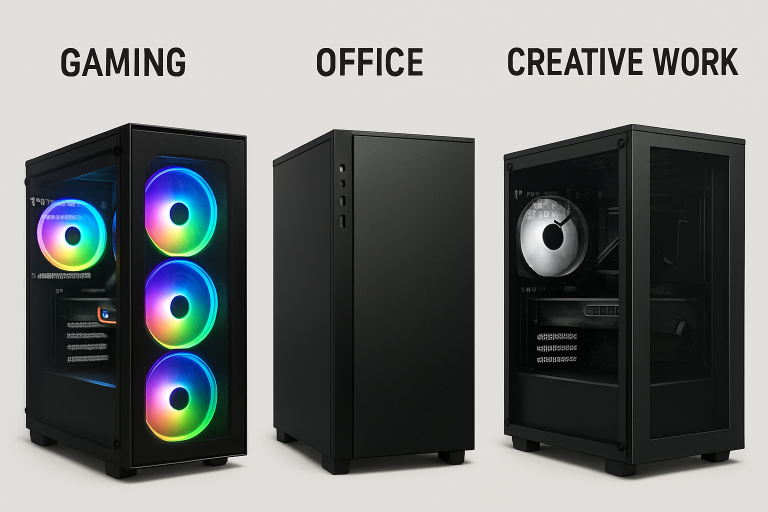Table of Contents
- Understanding Your Needs
- Evaluating Hardware Components
- Assessing Upgradeability
- Considering Cooling Solutions
- Reviewing Warranty and Support
- Budget Considerations
- Researching Brand Reputation
- Conclusion
With the increasing complexity and variety within the PC market, investing in a prebuilt PC can save time and alleviate the uncertainty many face when assembling a computer from scratch. Whether your goal is performance gaming, professional creative work, or multitasking for everyday productivity, a thoughtful approach to buying prebuilt systems will ensure your investment yields satisfying results. Exploring prebuilt gaming PCs can streamline your search and help you quickly compare vetted configurations tailored to different user profiles.
However, not all prebuilt computers are created equal. Your specific needs, combined with factors such as component quality, upgrade potential, and after-sales support, will determine which machine is best suited to your needs. Making the right choice involves balancing technical specifications, budget, and brand reliability, all while considering future needs. Being diligent in your research sets the foundation for a powerful and lasting computing experience.
This guide breaks down the key considerations for purchasing a prebuilt PC. From pinpointing your requirements to understanding upgrade paths and evaluating warranties, these best practices are designed to empower your search with confidence. Every buyer, from newcomers to tech enthusiasts, can benefit from a structured approach in a crowded marketplace.
Arming yourself with knowledge about components and brands, along with insights on warranties and external reviews, can prevent costly mistakes and provide ongoing satisfaction. This article will guide you through the critical decision points, enabling you to purchase a prebuilt system that is reliable, powerful, and well-suited to your plans.
Understanding Your Needs
Begin your search by clarifying exactly what you need from your next PC. Are you focused on high-refresh-rate gaming, demanding productivity tasks like software engineering or video editing, or simply seeking a system that handles web browsing and office work? Determining your core use cases helps narrow down the specifications you need—such as prioritizing a GPU for gaming or a more powerful CPU and additional RAM for multitasking. Additionally, consider your future needs to ensure your new system remains useful as applications become more demanding.
Evaluating Hardware Components
The foundation of any prebuilt PC lies in its hardware. Carefully review the listed components, with a particular emphasis on the CPU, GPU, memory (RAM), and storage capacity. These major parts must work together harmoniously; for example, pairing a high-end processor with a lackluster graphics card will bottleneck gaming performance. In addition to headline specs, research the brands and models of these parts—lesser-known brands can sometimes mean reduced reliability. Make sure you’re getting a balance of power that matches your needs.

Assessing Upgradeability
Technology advances rapidly, so your ideal prebuilt system should accommodate future upgrades. Look for models with extra RAM slots, multiple storage bays, and a case design that facilitates easy access to the motherboard. Systems with proprietary parts, such as custom PSUs or compact cases, may limit your ability to upgrade efficiently or cost-effectively. If you anticipate requiring more performance in the future, such as additional SSD space or a more powerful graphics card, verify that your chosen build will support these upgrades without necessitating a complete rebuild.
.
Considering Cooling Solutions
Effective cooling is crucial to the longevity and stable performance of any PC, particularly as modern components generate substantial heat. Analyze what cooling solution a prebuilt PC offers, whether it’s air cooling with multiple fans or a liquid cooling system. Proper airflow and sufficient cooling are crucial if you plan to run demanding software or game for extended periods. A well-cooled system not only performs better but also lasts longer, with a reduced risk of hardware failure. For additional information on which cooling types may be best, consult thorough guides and reviews from leading tech publications.
Reviewing Warranty and Support
The warranty and support package that comes with your prebuilt PC serves as a safety net. Research the warranty’s length and coverage—does it protect all major components, and is the term reasonable for the investment? Read user feedback and expert reviews about the manufacturer’s customer service to gain insight into their experience. These insights can help determine whether you’ll have reliable help if something goes wrong. Responsive customer support and clear, generous warranty terms should not be overlooked when comparing brands and builds.
Budget Considerations
Set a realistic budget before shopping and focus on systems that deliver high performance per dollar within that range. Remember that prebuilt PCs often carry a markup for assembly, pre-testing, and included warranties—but these factors also provide greater peace of mind. Be wary of deals that appear too good to be true, as they may compromise long-term reliability or future upgrade options for a lower sticker price. Consider what’s most important for you: immediate power, long-term flexibility, or a blend of both.
Researching Brand Reputation
Ultimately, consider brand reputation a key factor in your decision. Established manufacturers with consistent positive reviews are more likely to offer quality builds and uphold their warranty commitments. Scan user reviews, tech influencer insights, and customer satisfaction scores to get a comprehensive view. Thorough research here can prevent future headaches, ensuring you purchase from a company that stands behind its products and offers helpful support when needed.
Conclusion
Choosing the right prebuilt PC comes down to understanding your needs, scrutinizing component choices, evaluating upgrade possibilities, and giving attention to effective cooling and support. Complement these priorities with smart budgeting and a focus on trustworthy brands to make an informed choice that delivers powerful, reliable, and long-lasting performance. With careful consideration, your new prebuilt PC can offer you superior convenience and value for years to come.


